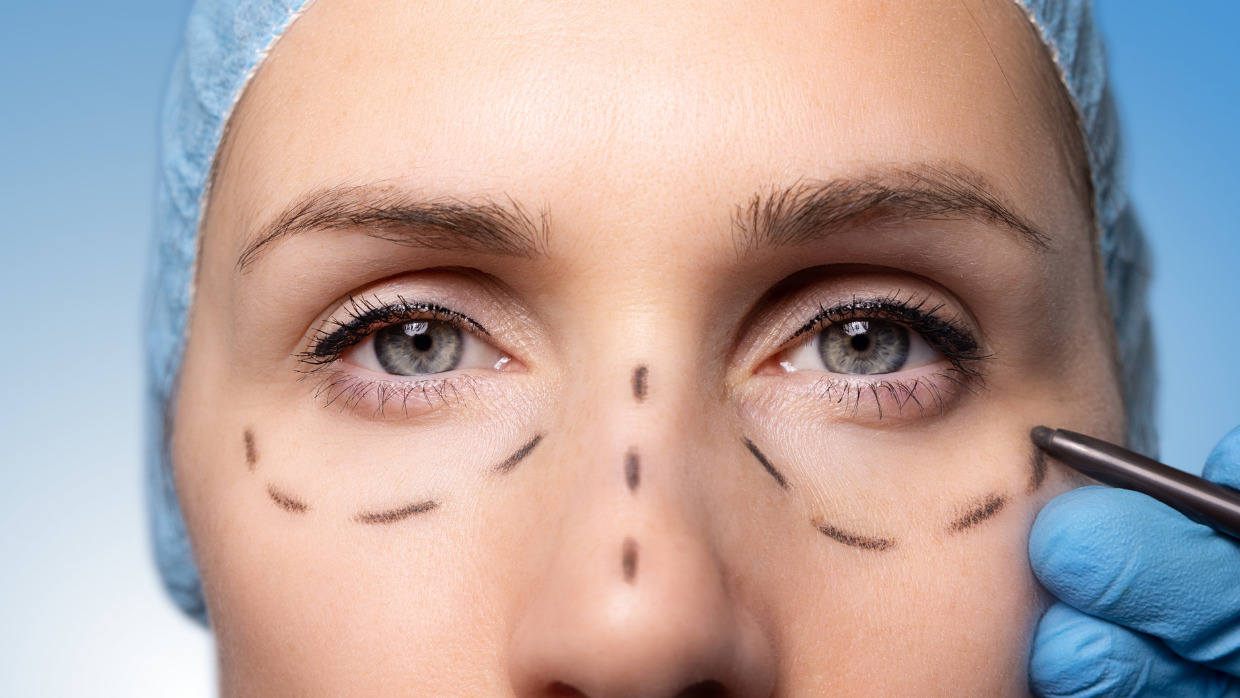 We Were the Lucky Ones
We Were the Lucky Ones


9 min read
It’s easy to dismiss cosmetic surgery as an exercise in vanity. But that isn’t the Jewish approach.
At 21, Alizza Shulman was ready. It was time to get rid of the bump on her nose.
“I can’t remember when I exactly got the idea,” she says about her rhinoplasty, or surgery to change the shape of her nose (commonly called a nose job). “But I just woke up and I said, ‘You know what? It bothers me so much. I am dealing with it.’”
And that was it.
Her surgeon was a stickler for symmetry and thought she would benefit from more extensive surgery. But she wasn’t having it.
“He looked at my face—he tacked it up how he would do it—he was like, ‘your cheeks are fine, but if you’re going to fix your nose, you have to fix your chin, too, because of symmetry.’ I thought to myself, ‘This is where plastic surgery can become an addiction.’ Maybe my chin isn’t as pronounced to make it look like what they would consider beautiful, but it didn’t bother me at all, and I asked myself, ‘Where’s it going to end?’”
Shulman was still in college at the time and underwent the procedure during her winter break. Recovery was quick. “I just put makeup under my eyes,” she says. “My nose was puffy for a year, but it went down.”
The procedure was liberating. It felt so good. And to this day—it’s not a perfect nose.
Today, over a decade later, she still thinks it was the right thing to do. She didn’t feel pressure at the time to get it done, and comments from others—both pro and con—didn’t factor much into her decision. It was just something she wanted to do.
“It bothered me,” she says. “I felt like maybe I needed to wear glasses to cover up my bump, and I didn’t like that feeling. So having the procedure was liberating. It felt so good. And to this day—it’s not a perfect nose, if you see my nose you wouldn’t think I got it done, it’s not 100 percent symmetrical in the sense of my face—but I do not regret it at all.”
Cosmetic surgery has been around for millennia, and the oldest reference—although disputed—is “a suggested fix for nasal injuries: manipulating the nose into the desired position before using wooden splints, lint, swabs and linen plugs to hold it in place,” from the Edwin Smith Papyrus, a 17th century BCE Egyptian medical text. In Jewish tradition, cosmetic surgery could be defined as broadly as any procedure that causes bleeding, which would even include piercings, making the earliest Jewish reference a gift mentioned in Genesis 24:22, “He took a gold ring (nezem/נזם in Hebrew, which are either earrings or a nose ring) … and asked, ‘Whose daughter are you?’”
Based on that, you could argue that bodily modification—at least something minor, like a piercing—is permitted according to Jewish law (especially since other types of modifications, like, for example, getting a tattoo, are generally not allowed). “Technically, a wound is something that causes bleeding,” Rabbi Micha Cohn, a Jewish legal authority, and the author of the multivolume work, Healing in Halacha, says. “Technically, a piercing is a wound, and yet we know it was done. From that you have to say that a) because it was very minor, and b) people wanted it, that it is permissible.”
But how far does that principle apply?
In some cases, it’s obvious: skin grafts and reconstructive surgery following an accident or fire, breast reconstruction in the wake of a mastectomy, skin removal after significant weight loss, and other situations where a) the surgery is restorative and b) the primary consideration is basic human dignity, are permitted in most cases. “A person is only human, and if it is a big deal you don’t have to go through life suffering,” Cohn says. “Especially if it’s something that came from an accident.”
Sometimes the pain is psychological, and cosmetic surgery is a way to help someone feel comfortable.
But other cases aren’t as obvious. Sometimes the pain is psychological, and cosmetic surgery is a way to help someone feel comfortable. Surgery isn’t necessarily a “beauty’ issue, but a way to enhance a person’s life.
“People are self-conscious of various things,” Dr. Howard N. Tepper, a plastic surgeon who practiced for 39 years in northern New Jersey, says. “They’re uncomfortable with what they see in the mirror, how they visualize themselves, or how they project how other people see or visualize them. We all have an image of what we think we look like or what we would like to look like, and it is interesting how common it is that people are displeased by what they see in photos of themselves. Sometimes it’s real and sometimes it’s not. Everyone incorporates visual images to how they regard, judge, or react to other people. It has a cultural implication as well. But it’s mostly a case of self-confidence and being comfortable with one’s self.”
And that’s consistent with the Jewish view as well. As one medieval source put it: “If his only pain is that he’s embarrassed to walk amongst other people, then [modifying his appearance] is permissible, because there is no pain greater than that.”1 Opinions vary as to how far that applies, although it’s clear that Jewish law is sensitive to a person’s psychological wellbeing.
“Plastic surgery wasn’t something I dreamt of my whole life or anything like that,” social media influencer, Lizzy Savetsky—she was also briefly a cast member of the Real Housewives of New York—says. Her one operation included a breast augmentation and a touch of liposuction under her chin and arms. “I wasn’t insecure by any means. I wasn’t doing it to look for happiness. But I felt, I had three babies, and I breast fed, and I wanted to feel good. I wanted to feel confident, and I really wanted to be restored to my pre-pregnancy body.”
According to Savetsky—her husband is a plastic surgeon and practices on Manhattan’s Upper East Side—surgery is sometimes the only option. “There are certain things which just cannot be fixed without surgery,” she says. “One of those things is post-pregnancy breasts. Like they are just never going to look the same unless you do something surgically. You’re gaining and losing weight during pregnancy and then when you’re nursing, the milk coming in and out causes the skin to stretch through the expansion and then afterwards. I didn’t need a breast lift—a lot of women do, but I didn’t need one—I just needed a small implant to restore me back to my pre-pregnancy volume.”
 Lizzy Savetsky and her family
Lizzy Savetsky and her family
For Savetsky, cosmetic surgery was more than just physically restorative, it was psychologically restorative, too, which was also something Tepper experienced with many of his patients. “When I realized what was happening to people who I was operating on—how their quality of life was significantly improved—I realized that for these people, [perceiving a physical deficiency] was as much as sometimes having a pain,” he says. “That may be on the extreme end, but nevertheless, we live in a society where frequently people just feel, ‘If I can correct this, and if I can without too much negativity or downside, why not?’”
“It wasn’t something negative from other people,” Alizza Shulman adds in reference to why she decided to have her rhinoplasty. “It was more something that bothered me tremendously.”
In addition to the issue of whether or not cosmetic surgery is permissible according to Jewish law, there are also other, more nuanced philosophical considerations. According to Cohn, “There is a philosophical concept about not changing the order of creation. It’s an important point, that there is a value as opposed to a prohibition.” Although as he notes elsewhere, “Mankind was given permission to use his abilities to change nature. However, this permission is very specific. It should only be used for important reasons.”
There were times where I would tell people that this is not going to make you look better or feel better.
Tepper takes a similar approach. While in general he feels he was providing his patients with tremendous benefit, there were occasions when he thought they were taking it too far. “There were times where I would tell people, ‘This is not for you,’” he says. “I would say, ‘You are going to find someone who will take your money, but I am telling you that this is not going to make you look better or feel better.’” He adds, “There’s something called body dysmorphia, where some people are never happy with their bodies. You could do every operation in the world, but it doesn’t matter. It’s what they see.”
But he also notes, “There’s a big psychological component—and people write this stuff off as just superficial and unimportant—but it’s serious stuff. I would always say, ‘I wish it wasn’t that important. I wish it wasn’t needed. I wish everyone was happy with what they saw in the mirror, or felt that this is what I have, it’s what God gave me and I am comfortable with it.’ But unfortunately, that’s not the case.”
Like most things in Jewish life, plastic surgery is complicated. It involves numerous issues, and a person considering it should do so in consultation with his or her rabbi and doctor. But that shouldn’t be daunting, as compassion, sensitivity, human dignity, and considering a person’s psychological health are basic Jewish values.
“If people are more confident about how they feel about themselves, they project themselves differently in a job interview, they interact differently with people, and they are different in relationships,” Tepper says. “It is not black and white. Cosmetic surgery does have a significant impact on people’s lives.”
“For me, not looking like I felt like I could look and should look was impacting my mental wellbeing,” Lizzy Savetsky says. “If something is causing somebody to feel insecure—and that’s holding them back from being able to live their best life—then that’s taking up mental space that could be used for doing good in the world. So why not?”

The dr who wanted to “fix” her chin behaved unethically. She came in for a nose job. He decided to make her uncomfortable about another part. That violates the Hippocratic oath.
I think you're mistaken Rachael. I had my nose done 70 years ago and am still sorry I didn't have my receding chin done. They woulld have been more balanced. My daughter and son both had their noses done, and my daughter needed her chin done, which she had. They're both well-adjusted people and comfortable in their skins. If that's what it takes, so be it.
If someone is really unhappy about a body part, such as a bumpy nose or birthmark, then cosmetic surgery could be a positive act. But when it comes to disguising the normal aging process, and having procedures such as facelifts, Botox, "eye jobs" and so on, it's a different problem - it's the result of society's brainwashing, by the media, to think we are deformed or ugly as soon as we show signs of age. In the Jewish faith age is respected, so it's all the more concerning that Jews want to disguise a reality that is actually a very good thing. We should all age, in preference to the alternative! And aging, and looking dignified and older, is a signal to the world to respect and cherish us all the more. How sad that people are ashamed of this gift of G-d.
I agree! I am relatively young, but just beginning to loose my very young look, and instead of mourning that, I choose to see it as a point of pride. Growing older means gaining wisdom and maturity, it is not something to be ashamed of.